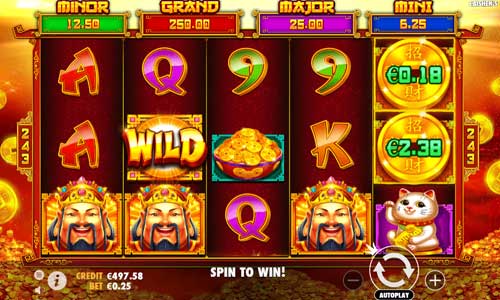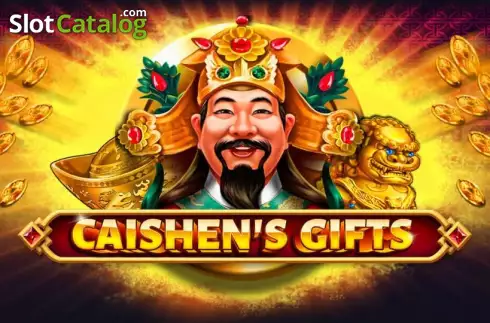by admin
Caishen's
Fat and cheerful, Caishen still rides his black tiger and wields a rod of iron. His Godly Accountant is a dab hand with diamonds and pearls, and putting an image of him in your home will do your bank balance no end of good. Caishen Facts and Figures. SBOBET Games - Play online slots, poker, lottery, virtual racing and casino games for FREE or with real money to enjoy generous payouts. Caishen refers the god of wealth and money in Chinese mythos.




God Of Wealth China
The God of Money (caishen 財神) is one of the most popular deities in Chinese folk religion. He is identified with a semi-historical person called Zhao Gongming 趙公明, who is also called 'Marshal Zhao Gong' 趙公元帥, or 'Zhao of the Mysterious Altar' Zhao Xuantan 趙玄壇. This person was only identified as the God of Money from the Tang period 唐 (618-907) on. In older texts like the Soushenji 搜神記, Zhengao 真誥 or Taishang dongyuan shenzhou jing 太上洞淵神咒經, Zhao Gongming is mentioned as one of the Five Gods of Pestilence 五瘟神. He is first mentioned as the God of Wealth in the Yuan period 元 (1279-1368) version of the Soushenji in the Daoist Canon Daozang 道藏, and in the Sanjiao soushen daquan 三教搜神大全. In the last book it is said that he came from the region of Mt. Zhongnan 鍾南 (also written 終南). When the king of Qin 秦 unfied the empire in 221 BCE he withdrew to the mountain and cultivated the Dao 道. He finally was given an audience with the Jade Emperor 玉帝 who appointed him Lieutenant Marshal of the Divine Clouds (Shenxiao fushuai 神霄副帥). His hexagram is qian 乾 'Heaven' (see Yijing 易經), and he represents the energy of the agent metal and water (see Five Agents 五行). He represents the combination of these agents as the Dao 道 'Way', applies them as the universal standard, wielding authority over thunder and lightning. His seat is on the Western Terrace of Mt. Taihua 泰華西臺 (?). Receiving the edicts of the Jade Emperor, he establishes the three borders, controls the five regions and administers the nine provinces. He acts as the Great General of the Upright Hall (Zhidian da jiangjun 直殿大將軍) and as the Attendant Censor of the Polestar (Beiji shi yushi 北極侍御史). It is said that during the Han period 漢 (206 BCE-220 CE) the Jade Emperor was requested to make Zhao Gongming Marshal of the Mysterious Altar of the Orthodox Unity (Zhengyi xuantan yuanshuai 正一玄壇元帥), in order to protect the authority of Daoist masters.After his ascendancy to Heaven, he took over the protection of famous mountains. He also administered judgments from his Altar of the Three Origins (sanyuan kaitan 三元開壇), and was very inclined to pardon delinquents, except those who repented their misdoings. Zhao Gongming was therefore a very popular deity and was given various canonical epiteths referring to his many functions, like Gaoshang shenxiao wangfu da dudu 高上神霄王府大都督 'Grand Protector of the Supreme Royal Court of the Divine Cloud', Wufang zhi xun yushi 五方之巡御史 'Inspecting Censor of the Five Regions', Sanjie da dudu 三界大都督 'Grand Protector of the Three Borders', or Yingyuan zhaoli hou 應元昭烈侯 'Bright Marquis of Corresponding to the Origin'.
According to these legends, Zhao Gongming had a lot of various functions. As the Lieutenant Marshal of Divine Clouds he invoked thunder and lightning and commandeered wind and rain. As Celestial Teacher Zhang 張天師, protective deity of the elixir (liandan shouhu shen 煉丹守護神) of the Mysterious Altar, he cared for law and order and established punishment and mercy. He also functions as the God of Pestilence by healing illness and protecting from infection. Finally, as the God of Money, he cares for private fortune and for fairness in trade and business.
Zhao Gongming is also a figuring in the late Ming period 明 (1368-1644) romance Fengshen yanyi 封神演義, where he is a supporter of the evil King Zhou 紂 of the Shang dynasty 商 (17th-11th cent. BCE) and fights against Xiao Sheng 蕭升 and Cao Bao 曹寶 who side with King Wu 周武王 of Zhou 周 (11th cent.-221 BCE). Both sides fight heroically by using all kinds of martial arts, but in the end, the strategist Jiang Ziya 姜子牙 (representing the historical Grand Duke of Qi 齊太公) casts a spell to kill Zhao Gongming. At the end of the book, when Jiang Ziya creates the gods and invested them as rulers over starry constellations, Zhao Gongming is made Jinlong ruyi zhengyi longhu xuantan zhenjun 金龍如意正一龍虎玄壇真君 'Perfect Lord of the Mysterious Altar of the Tigers and Dragons of the Gold Dragon Orthodox Unity Fulfilling Wishes'. He commands some officials caring for fortune and prosperity, like 'Heavenly Venerated' (tianzun 天尊) Xiao Sheng who attracts jewels (zhao bao 招寶 ), Heavenly Venerated Cao Bao who receives gems (na zhen 納珍), 'Commissioner' (shizhe 使者) Chen Jiugong 陳九公 who attracts fortune (zhao cai 招財) or 'Immortal Minister' (xianguan 仙官) Yao Shaosi 姚少司 who profits the markets (li shi 利市).
During the Ming and Qing 清 (1644-1911) periods in almost all towns shrines of the God of Money were to be found. His statue is clothed with an iron cap, and holds an iron club and a 'winged jewel' (qiaobao 翹寶, i.e. silver or putative gold ingots in the shape of a boat). With a black face, a dense beard, he has a very martial appearance, especially because he is riding a black tiger. His birthday is celebrated on the 15th day of the 3rd month, in some regions on the 5th day of the first lunar month (see calendar). On these days the whole community brings sacrifices before his shrine, especially merchants.
Zhao Gongming is venerated as the God of Money since a long time. He is also acknowledged in this function in all parts of China. In some regions he is identified with the strategist Fan Li 范蠡 or with He Wulu 何五路 (called God Wulu 五路神). The book Zhuding yuwen 鑄鼎餘聞 explains that the god Wulu is in fact one of the five domestic deities to which sacrifices were delivered (wusi 五祀 'Five Sacrifices'), namely that to the door (main gate) gods, the door (entrance) gods (Menshen 門神), the eaves of the roofs of inner courtyard buildings (zhongliu 中霤), the goddess of the kitchen (Zaoshen 灶神), and the god of the pathway (xingshen 行神). Who helps those beginning a journey on the 'five ways' (wulu 五路) to become rich. The local gazetteerWuxi xian zhi 無錫縣志 explains that He Wulu lived at the end of the Yuan period and was slain by bandits. It is important to not that He Wulu is a different person than Zhao Gongming, although both are Gods of Money. In accordance with the structure of Chinese bureaucracy, there is also talk of a 'civilian god of money' (wen caishen 文財神) and a 'military god of money' (wu caishen 武財神). The former is identified with the Shang period prince Bi Gan 比干, the latter with Guan Yu 關羽 (God Guan 關帝), who is normally venerated as the God of War. Some local gazetters, as the Gusu zhi 姑蘇志 or the Zhejiang tong zhi 浙江通志 say that he was a cousin of the Three Kingdoms period 三國 (220-280) general Zhao Zilong 趙子龍 who served the Emperor of Shu 蜀 (Sichuan), where it was custom to present offerings to the god Luo Gong 羅公.
The Qing period author Zhu Anren 諸安仁 describes in his book Yingkou zaji 營口雜記 that the God of Money is also venerated in shape of a lantern, upon which his picture is painted.
Sources: Yuan Ke 袁珂 (ed. 1985), Zhongguo shenhua chuanshuo cidian 中國神話傳說詞典 (Shanghai: Shanghai cishu chubanshe), pp. 198, 302. ● Li Yangzheng 李養正 (ed. 1993), Daojiao shouce 道教手冊 (Zhengzhou: Zhongzhou guji chubanshe), pp. 167-168. ● Qing Xitai 卿希泰 (ed. 1994), Zhongguo daojiao 中國道教 (Shanghai: Zhishi chubanshe), Vol. 3, pp. NNN.
Caishen Temple
